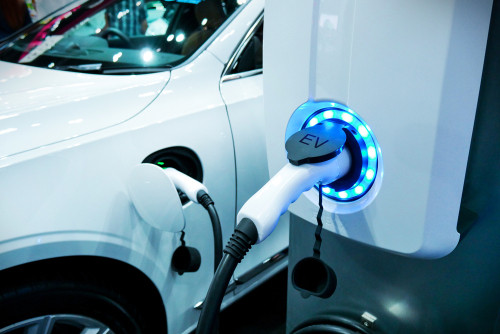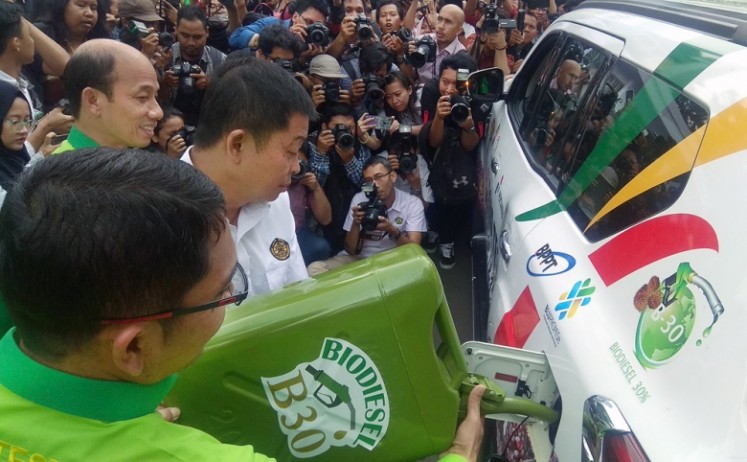Popular Reads
Top Results
Can't find what you're looking for?
View all search resultsPopular Reads
Top Results
Can't find what you're looking for?
View all search resultsBiofuel, not EVs, closer destination in car industry growth path
While biofuel vehicles can be refueled through existing gas stations, Indonesia needs to build some 31,000 commercial charging stations over the course of 10 years to reach its EV goals.
Change text size
Gift Premium Articles
to Anyone
W
hile the government has accelerated efforts to make the country a global hub for electric vehicle (EV) batteries, biofuel-based transportation is seen as a more immediate game-changer in Indonesia’s automotive industry.
Febby Tumiwa, the executive director of the Institute for Essential Services Reform (IESR), said from 2025 to 2030, most people in Indonesia would still use vehicles with internal combustion engines (ICE), and the government would need to produce biofuel to fill the gap between domestic oil production and consumption without relying on imports.
“I think that for the next 10 years, there won’t be a conflict between EV battery and biofuel development, but after that, EVs will be the dominant trend among the public,” Febby told The Jakarta Post.
He said the government might need a clear timeline to phase out biofuel, such as by not creating new plantations or refineries and by making palm oil products for other industries, should EVs became preferable option in the automotive industry.
The government has shown greater interest in the EV battery industry in the past few years and ramped up efforts to issue regulations and find international partners to realize its vision.
With the issuance of Presidential Regulation No. 55/2019 Indonesia has mapped out a plan for EV development as countries around the world aim to phase out ICE vehicles.
In December 2020, by publishing its plan for battery-based electric vehicles, the Energy and Mineral Resources Ministry committed to having at least 786,586 electric vehicles on the road by 2025.
In March, four state-owned companies signed an agreement to form Indonesia Battery Corporation (IBC), an EV battery holding company. IBC plans to partner with other companies, most notably China’s CATL and South Korea’s LG Chem, the world’s top two EV battery producers, to create an end-to-end EV battery supply chain in Indonesia.
Read also: Four SOEs unite to form EV battery producer
The country has large reserves of both nickel and cobalt, which are the two main raw materials for lithium batteries. The battery is the most expensive component of an EV.
However, Febby said the development of the EV industry should be accompanied by an increased share of renewable energy in the nation’s energy mix to ensure that EV use would lower carbon emissions.
Association of Indonesian Automotive Manufacturers (Gaikindo) chairman Yohannes Nangoi said that while EVs would be suitable for families and public transportation with a limited travel range, such as the Transjakarta buses, biofuel would still play a big role for other transportation purposes.
“Indonesia is rich in palm oil, which is environmentally friendly and can be used by heavy vehicles without requiring a new refueling infrastructure,” he said in an online discussion.
While biofuel vehicles can be refueled through existing gas stations, Indonesia needs to build some 31,000 commercial charging stations over the course of 10 years to reach its EV goals.
“EV is just one of several green transportation [options], alongside biofuel and hydrogen cells. I believe we can develop EV and biofuel simultaneously,” Yohannes said.
Read also: Switch to electric vehicles could 'end oil era': Analysis
Indonesia has been developing biofuel for almost 15 years to reduce reliance on oil imports and tackle its oil and gas trade deficit. Oil consumption in the country has exceeded production since 2004, and oil imports have been on an increasing trend ever since.
The imports only declined in 2018 and 2019, as the government mandated a share of 20 percent and later 30 percent of palm-oil-derived biofuel in diesel fuel blends known as B20 and B30 biodiesel. For the next step, authorities are expecting to roll out B40 biodiesel – containing 40 percent biofuel – by 2022.
Buoyed by the success of the B20 program, the government decided to increase CPO content in biodiesel to 30 percent. Called B30, this biofuel will be introduced in early 2020. (JP/Budi Sutrisno)McKinsey & Company Indonesia partner Thomas Hansmann said EV batteries and biofuel would complement one another, but over the next two decades, EV batteries were predicted to displace gasoline as the main energy source for passenger cars and two-wheelers.
McKinsey estimated that as of 2021, Indonesia’s B30 mandate had already replaced up to 9 billion liters of fossil fuel per year.
Hansmann said that going forward, biofuels might also play a more important role than electric battery technology for air transportation, given that several airlines had pledged to use sustainable aviation fuels (SAF) by 2025.
“In the long run, EVs may have a larger impact, as we expect that most new vehicles sold in Indonesia will be electric by 2035 to 2040,” he told the Post.











